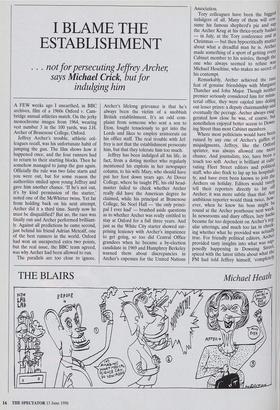I BLAME THE ESTABLISHMENT
. . . not for persecuting Jeffrey Archer,
says Michael Crick, but for
indulging him
A FEW weeks ago I unearthed, in BBC archives, film of a 1960s Oxford v. Cam- bridge annual athletics match. On the jerky monochrome images from 1964, wearing vest number 3 in the 100 yards, was J.H. Archer of Brasenose College, Oxford.
Jeffrey Archer's trouble, athletic col- leagues recall, was his unfortunate habit of jumping the gun. The film shows how it happened once, and the four runners had to return to their starting blocks. Then he somehow managed to jump the gun again. Officially the rule was two false starts and you were out, but for some reason the authorities smiled upon young Jeffrey and gave him another chance. 'If he's not out, it's by kind permission of the starter,' noted one of the McWhirter twins. Yet far from holding back on his next attempt, Archer did it a third time. Surely now he must be disqualified? But no, the race was finally run and Archer performed brilliant- ly. Against all predictions he came second, just behind his friend Adrian Metcalf, one of the best runners in the world. Oxford had won an unexpected extra two points, but the real issue, the BBC team agreed, was why Archer had been allowed to run.
The parallels are too close to ignore. Archer's lifelong grievance is that he's always been the victim of a snobbish British establishment. It's an odd com- plaint from someone who sent a son to Eton, fought tenaciously to get into the Lords and likes to employ aristocrats on his office staff. The real trouble with Jef- frey is not that the establishment persecute him, but that they tolerate him too much.
Jeffrey has been indulged all his life, in fact, from a doting mother who regularly mentioned his exploits in her newspaper column, to his wife Mary, who should have put her foot down years ago. At Dover College, where he taught PE, his old head- master failed to check whether Archer really did have the American degree he claimed, while his principal at Brasenose College, Sir Noel Hall — 'the only princi- pal I ever had' — brushed aside questions as to whether Archer was really entitled to stay at Oxford for a full three years. And just as the White City starter showed sur- prising leniency with Archer's impatience to get going, so too did Central Office grandees when he became a by-election candidate in 1969 and Humphrey Berkeley warned them about discrepancies in Archer's expenses for the United Nations Association.
Tory colleagues have been the biggest indulgers of all. Many of them will con- sume his famous shepherd's pie and sup the Archer Krug at his thrice-yearly bashes — in July, at the Tory conference and at Christmas — but then hypocritically mutter about what a dreadful man he is. Archer made something of a sport of getting every Cabinet member to his soirees, though the one who always seemed to refuse was Michael Heseltine, who makes no secret of his contempt.
Remarkably, Archer achieved the rare feat of genuine friendships with Margaret Thatcher and John Major. Though neither premier seriously considered him for minis- terial office, they were cajoled into doling out lesser prizes: a deputy chairmanship and eventually the peerage. Archer always exag- gerated how close he was, of course, but nonetheless enjoyed better access to Down- ing Street than most Cabinet members. Where most politicians would have been ruined by any one of Archer's gaffes or misjudgments, Jeffrey, like the Oxford sprinter, was always allowed one more chance. And journalists, too, have been touch too soft. Archer is brilliant at eel' vating Fleet Street editors and political staff, who also flock to lap up his hospitali- ty, and have even been known to join the Archers on holiday. Editors would rarely, tell their reporters directly to lay °f1 Archer; it was more subtle than that. Any ambitious reporter would think twice, how- ever, when he knew his boss might be round at the Archer penthouse next wee' :, In newsrooms and diary offices, lazy hacks became far too dependent on Archer's reg- ular utterings, and much too lax in check- ing whether what he provided was actually true. For friendly political editors, Archer provided tasty insights into what was stir posedly happening in Downing Street, spiced with the latest titbits about what the PM had told Jeffrey himself, `completely off the record, of course'. Equally, broadcasters could always rely on Archer for a good interview; he was great box-office, guaranteed to deliver for any discussion programme or by-election film. Yet too often the pertinent questions went not only unanswered, but unasked. It's now almost four years since the Anglia shares affair first broke, but until this spring I can't recollect any radio or TV broadcaster asking Archer the obvious question: why did he buy the shares for his friend Broosk Saib at a time when his wife Mary was involved in takeover talks? Now Archer's impressive network of top Tories and leading editors is rapidly col- lapsing. With his party denied office, what value are Archer's connections now? While William Hague may have attended the odd garden party in Grantchester, the Tory leader's team has more his true mea- sure. Mr Hague would deeply love to find an alternative mayoral candidate, and was notably unwilling to come to Archer's aid When Sir Timothy Kitson sent his letter last weekend demanding that the novelist be referred to the Tories' new ethics and integrity committee. It's a genuine coinci- dence that Kitson was once MP for Mr Hague's seat of Richmond, but I've good reason to believe Sir Tim's intervention Was prompted — at least indirectly — by someone in the leader's entourage. Mr Hague himself, though, was probably unaware of the intrigue. William Hague is surely too shrewd, how- ever, not to seize the chance that Kitson now offers of stopping him, and if Archer is hauled before the ethics committee he expects a tough grilling. At present the com- mittee comprises only two people, one of Whom, Sir Archie Hamilton, was the prime victim of Archer's outrageously populist sPeech at last year's Tory conference in which he lambasted Tory MPs for disloyalty. Yet Archer has bounced back too often to write him off. If he can't stand for mayor this time, he'll try again when mem- ories have faded. Many admire his fighting spirit and applaud his determination to answer the allegations in my book and Paul Foot's powerful article in the Stan- dard last March. Who knows? People unfamiliar with the details may once again, Just like the starter in 1964, give him the benefit of the doubt. Astonishingly, in the 1966 Varsity match Al.,. cher made yet another false start. This time it was the 220 yards hurdles. Again he better again he went on to perform far better than expected. The official announc- er at White City that day was a former blue from Cambridge, one C.E. Parkinson of Emmanuel College. Now in his role as Tory chairman, Cecil Parkinson's voice 111, ay help determine whether this time, Archer merits disqualification.
Michael Crick is the author of Jeffrey Archer: Stranger Than Fiction (Penguin) and a reporter on BBC 2's Newsnight.



































































 Previous page
Previous page